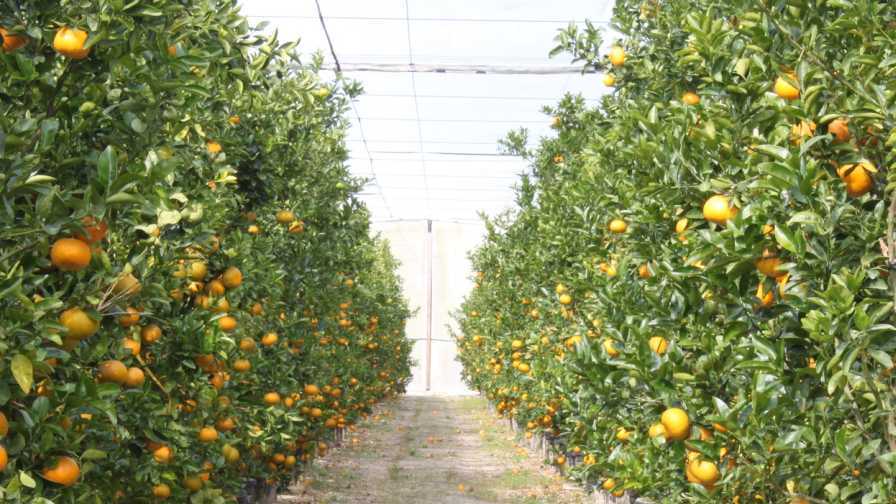Scientists on Inside Track to Shut Out Citrus Greening

Photo courtesy of UF/IFAS
For Florida citrus growers, the ability to raise trees and produce a healthy crop in an HLB-free environment is all but a distant memory, and perhaps a future dream. But protected agriculture, as it suggests, could provide safe refuge from the scourge that has slashed production over the last decade. Case in point, newly published UF/IFAS research indicates grapefruit grows better inside screenhouses than in unprotected groves.
Given the predicament the sector finds itself in, a system known as Citrus Under Protective Screen (CUPS) could be crucial to Florida growers, UF/IFAS researchers say. Although screenhouse cost is high and varies depending on facility size, two Florida commercial growers are using CUPS, according to Rhuanito Ferrarezi, a UF/IFAS Assistant Professor of citrus horticulture at the UF/IFAS Indian River Research and Education Center (IRREC) in Fort Pierce. “Growing young trees in screenhouses may allow growers to produce greening-free trees,” stated Ferrarezi, the lead author of the new research. “The ultimate benefit of growing citrus trees in the screenhouses would be increased yield and fruit quality.”
In two new studies published in the journal HortTechnology, scientists at the UF/IFAS IRREC compared grapefruit grown in a screenhouse vs. the fruit grown in open air. They also tested grapefruit grown in-ground against that grown in containers.
In one study, researchers found the screenhouses reduced solar radiation and maximum wind gusts, among other environmental variables. In the other, they found the screenhouses provided a better growing environment for in-ground grapefruit because the protected structures accelerated young tree growth compared with open-air plantings. Among other advantages, screenhouses keep out the Asian citrus psyllid, the vector of the bacterium that causes citrus greening.
Ferrarezi cautions it may be too early to conclude that if the trees grown in the screenhouse will be superior to trees grow in the open air. That will require more testing, he said.
While Ferrarezi only tested grapefruit at the IRREC, Arnold Schumann, a UF/IFAS Soil and Water Sciences Professor, has been hard at work testing grapefruit, mandarin, orange, and lime at the UF/IFAS Citrus Research and Education Center in Lake Alfred.
“We don’t have enough years of data to guarantee the screenhouses are superior,” Ferrarezi concludes, “even though the results are showing that trend.”









